December 5, 2023
ECU College of Business Research: navigating farm waste problems

Publication Name
International Journal of Retail & Distribution Management
Authors
Steven M. Mueller (Longwood University), Christine M. Kowalczyk (COB), Brian J. Taillon (COB) and William J. Rowe (COB)
Summary
This research examines the concept of gleaning to reduce farm waste and proposes a resource-based Gleaning Innovation Framework which can lead to differentiated consumer products.
What are the practical implications of your findings?
The proposed Gleaning Innovation Framework provides a platform for innovation across the supply chain to reduce farm waste. The research contributes to the farm waste debate with evidence that gleaning can assist in the reduction of farm waste through consumer product innovation. Developing innovations to reduce farm waste in sustainable and environmentally friendly ways would not only benefit the supply chain platform but also society.
What types of practitioners can take action based on your research?
Members of the agricultural supply chain, including farmers, brokers, wholesalers, and retailers, can become innovators in the gleaning process.
What are the top three takeaways from your findings?
- Practitioners and consumers are cognizant and invested in reducing farm waste, with gleaning as a plausible solution.
- The Gleaning Innovation Framework proposed that participants in the farm food supply chain can be innovators in solving the farm waste problem.
- Innovative efforts can provide a competitive advantage in the marketplace to address the systemic social issue of farm waste.
- Categories:
- Research
- Uncategorized
